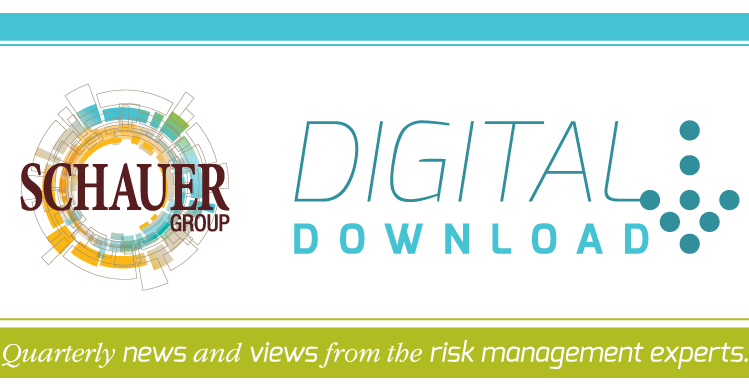During the coronavirus disease (COVID-19) pandemic, some employers are currently staying open as essential businesses—for organizations that are not open, many plan to welcome back employees shortly. The Centers for Disease Control and Protection (CDC) advises that face coverings should be worn in public, including places of employment. There are many questions about the differences between masks and face coverings, and which is appropriate to wear.
Schauer Group recommends employers familiarize themselves with best practices related to masks and face coverings in the workplace—including any state-specific guidelines—to help prevent the spread of COVID-19.
What Is Considered a Mask or Face Covering?
Employers should know that masks and face coverings are different and should be used by different types of professions in the workplace.
Face Coverings
According to the CDC, a cloth face covering can help prevent the spread of COVID-19. A face covering refers to a cloth covering of the face and is not a medical-grade mask. These can be purchased or even made at home. Face coverings will be an appropriate consideration for employers to consider in many industries.
Masks
Masks refer to filtering respirators, such as an N95, K95, medical-grade or surgical mask. These are currently being utilized by vital professions such as health care. Due to the COVID-19 pandemic, masks are in short supply, and governments and health organizations are currently designating these as critical supplies.
Should My Organization Use Face Coverings or Masks?
Organizations should consider what types of services they provide and check with local guidance. While masks can help prevent the spread of COVID-19, the CDC considers these as critical supplies that must continue to be reserved for health care workers and other medical first responders. Unless providing critical services in one of these professions, most employers will want to consider using cloth face coverings rather than masks. Before making any determinations, employers should check updated guidelines from sources such as the CDC and local governments.
Face Coverings in the Workplace
Studies show that people with minimal or no symptoms can still have COVID-19. According to the CDC, while wearing face coverings shouldn’t replace social distancing, cloth face coverings can help prevent the transmission of COVID-19.
The CDC currently recommends wearing face coverings in public and lists guidelines for effective cloth face coverings, which include the following characteristics:
- A tight fit but comfortable on the face, allowing for breathing without restriction
- Secured with ties or ear loops
- Includes multiple layers of durable fabric, able to withstand washing for reuse
- Allows for breathing without restriction
General best practices for implementing face coverings in the workplace include:
- Create specific policies. Employers should have policies and practices in place for use of face coverings. Topics to cover may include:
- Who is expected to wear face coverings
- How face coverings will be supplied
- Using face coverings correctly
- Plan for unique situations. Employers will also want to plan for unique situations, including:
- An employee who objects to wearing a face covering
- An employee who loses his or her face covering
- An employee who is unable to wear face coverings due to a medical condition
- An employee who would prefer to wear their own face covering, if the employer will be providing them
- Communicate expectations to all employees. Employers should communicate policy updates related to face masks to all employees. This may include posting notices, as well as training employees on best practices. Communications should cover topics such as whether face coverings are optional or mandatory, who will be providing them and how they will be washed, and how training will be conducted.
- Ensure face coverings are washed daily. According to the CDC, washing face coverings in a washing machine should properly clean it.
Effective practices can ensure that face coverings are being used effectively and that employers can plan for how to introduce face coverings in the workplace. Many health experts advise that COVID-19 may even come back in additional waves, and employers may end up utilizing COVID-19 related business practices for the near future. When implementing face coverings in the workplace, employers should check with local guidelines and laws, and seek legal counsel when implementing any policies or changes.
Paying for Face Coverings
In some states, organizations are currently required to supply face coverings to employees, while others offer more flexibility. Employers should check with local guidelines for accurate and updated information. For employers that are seeking face coverings, they can often be made in-house or, in some cases, purchased. The CDC provides procedures for how face coverings can be made. For employers that are requesting employees to make or purchase their own face coverings, employers may be required to reimburse employees for time, materials and costs, depending on locality.
Training Employees on Properly Wearing Face Coverings
To ensure the best use of face coverings in the workplace, employers may want to consider a training program for employees. Training dialogue may include the following best practices:
- Before entering the workplace, ensure your cloth face covering is snug and secure, and is secured with ties or ear loops. Make sure you are able to breathe comfortably and without restriction.
- Remember—wearing a cloth face covering does not replace COVID-19 best practices, such as washing hands often, maintaining social distancing of 6 feet or more and avoiding touching of the face.
- When it is time to take off a face covering, avoid touching hands to your face, nose and mouth. As soon as the face covering has been removed, make sure to wash your hands immediately.
- Cloth face coverings should be washed in a washing machine between uses.
Masks in the Workplace
Along with face coverings, masks can help prevent the spread of COVID-19. For appropriate employers, such as organizations that employ health care workers and other medical first responders, masks such as the N95 may be appropriate rather than face coverings. Though N95 masks are not new to professions such as health care, employers should ensure that all employees are aware of any updates and current best practices.
General best practices for implementing masks in the workplace include:
- Ensuring an appropriate supply of masks. Employers will want to consider policies for how to most efficiently use masks, such as an N95 mask. The CDC offers guidance on how to best utilize supplies to ensure masks are provided to those most at risk.
- Create specific policies. Employers should have policies and practices in place for use of masks. Topics to cover may include:
- Who is expected to wear masks
- Using masks correctly
- Expectations of the number of masks used per shift
- Disposal expectations
- Reuse expectations, if applicable
- Plan for unique situations. Employers will also want to plan for unique situations, including:
- An employee who objects to wearing a mask
- An employee who loses his or her mask, and has surpassed guidelines for using a certain number of masks per shift
- An employee who is unable to wear a mask due to a medical condition
- Communicate expectations to all employees. Employers should communicate policy updates related to masks to all employees. This may include posting notices, as well as training employees on best practices. Communications should cover topics such as whether face coverings are optional or mandatory, who will be providing them and how training will be conducted.
When implementing masks in the workplace, employers should check with local guidelines and laws, and seek legal counsel when implementing any policies or changes.
Paying for Masks
In some states, organizations are required to supply masks to employees for specific professions, while others offer more flexibility. Due to current circumstances, employers should communicate with local governments regarding the availability and use of masks. Employers should check with local guidelines for accurate and updated information.
Training Employees on Properly Wearing Masks
To ensure best use of masks in the workplace, employers may want to consider a training program for employees. Training dialogue may include the following best practices:
- Before entering the workplace, ensure your mask is snug and secure, and you are able to breathe comfortably and without restriction.
- Remember—wearing a mask does not replace COVID-19 best practices, such as washing hands often, maintaining social distancing of 6 feet or more and avoiding touching of the face.
- When it is time to take off a mask, avoid touching your hands to your face, nose and mouth. As soon as the mask has been removed, make sure to wash your hands immediately.
Protecting the Safety and Health of Employees
As employers plan for how to operate both during and post-coronavirus, creating preventive best practices can set up organizations for success. By being proactive and establishing appropriate measures and practices, employers can not only help prevent the spreading of diseases—but put employees at ease that necessary steps are being taken to ensure the health and safety of those who will be spending time in the workplace.
As laws and guidelines related to COVID-19 update, employers should consult with legal counsel when updating or changing policies. As you consider planning for your organization in the wake of the COVID-19 pandemic, contact Schauer Group for additional COVID-19 related resources.






